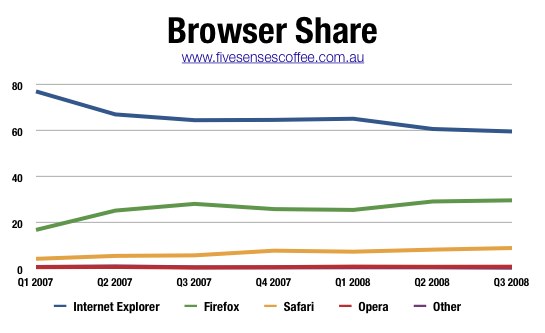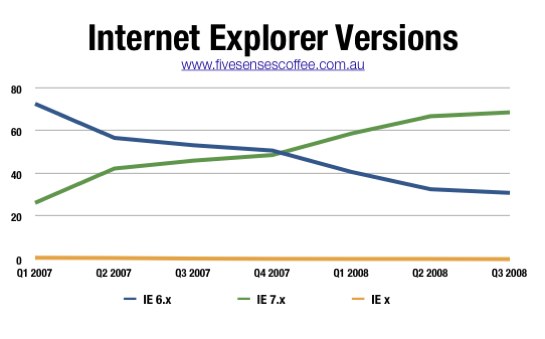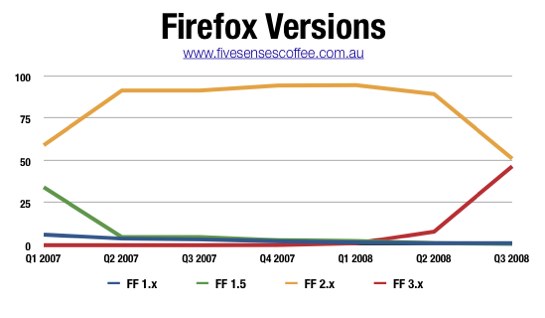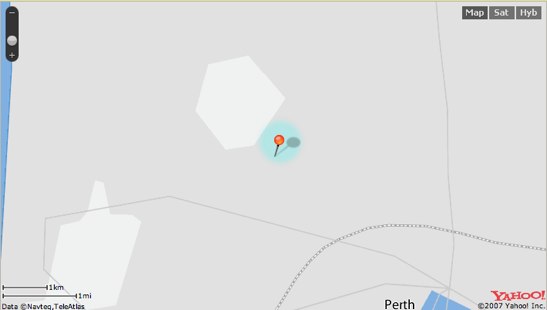Edge of the Web: Ben Buchanan
Although it only seems like yesterday that I got back from Sydney and the wonderful Web Directions South, things are rapidly heating up for Perth’s own Web Conference: Edge of the Web, taking place at the UWA Club on November 6 and 7, 2008 - tickets available now!.
There is a huge list of international and national speakers on the program, one of whom is Ben Buchanan. I recently conducted a short email interview with Ben, talking about some of the subjects that he’ll touch upon in his talk Hacking Humans: Advocating for a better web
Ben is just one of a range of awesome speakers who are going to be presenting at Edge of the Web on the 6th November. On the following day, there are 4 half-day workshops on a diverse range of topics.
And then, to cap the two days off in style, Friday night sees the WA Web Awards, where, in a burst of glorious self congratulation, the best of the WA Web industry are recognised for their efforts. Get your tickets here.
Web Directions South 08
So, thanks to the fine people at 5 Senses Coffee, I trundled over to Sydney for Web Directions South 08.
Thursday, 25th September 2008
Opening Keynote - Lynne Johnson
Boo. So mismatched to the audience it wasn’t amusing in the slightest. If we were a bunch of magazine publishers from 2003, then it might have been interesting, but we weren’t, and so it wasn’t.
Derek Featherstone
Nubbins. Yay!!
I’ll just pretend that the opening keynote didn’t happen, and that this was the start. It’s always good to see someone who A) has command of their field and B) is a great presenter. Totally comfortable on stage, and thoroughly knowledgeable about his topic, which he managed to make seem almost exciting, which is pretty hard for what is essentially a dry topic.
iPhone Development
Tim Lucas and Pete Ottery worked on the iPhone Site and did a good presentation on some of their experiences. Perhaps because I had already started on the iPhone site for 5 Senses and I had already encountered most of those problems, I didn’t really come away with much. But that’s cool, because it was an intro level talk, not for an iPhone Dev Conference or anything.
JavaScript Libraries/Frameworks
Yeah, good times, much laughter, fun, and frivolity, and then when Cameron rolled out the Drum Machine - FUCKING BRILLIANT.
I’m not sure if I actually learned anything, except that just about everyone is using jQuery, and those of us still on Prototype are mocked mercilessly.
August de la Rejos
Hmmm, ok, but hold the ads.
An interesting talk about the progress of user interaction with computers, as well as the psychology behind it, that had some wonderful videos outlining potential future developments, but was undermined by the fact that they were MicroSoft corporate videos. Oh well.
WebJam8
Bucketloads of awesome, mixed in with tasty beverages, fine companies that sponsored the tasty beverages, fine talks, and conversation. Mad times. Cannot wait until WebJam 9 as part of Edge of the Web
Friday, 26th September 2008
Jeffrey Veen
Hot. Wired.
Awesome talk about visualising data, and what good design can achieve. Memorable, and featuring the entirely wonderful Gapminder World
Gina Bolton
No. Not good. I don’t know if Gina has a ninja like mastery of CSS (I’m guessing she does since she consults/designs for companies like Apple and has written a book), but statements like “from what I’ve heard when talking to developers, computers start counting at 0” doesn’t make code-monkey happy.
A thorough understanding of your topic, and avoiding statements like “I haven’t checked the blogs for a month or so, so I don’t know if the CSS3 Working Recommendation has been ratified or not.” Seriously!
Michael(TM) Smith
Not too bad. Bit of a laundry list. Of course, any recitation of the trials and tribulations of HTML 5 isn’t really going to be anything but dry. Still, good to hear for the most part. However, the take away from this, Gina’s and Douglas Crockford’s talk is that it’s been 10 years since any successful revision to HTML, CSS or ECMAScript, which just instills wonderful amounts of trust and faith in committees.
And really? Michael(TM) What is this - Burning Man?
Myles Eftos.
Huzzah! The madpilot flew like a crazy bastard over the top of the dangerous territories of OpenID and OAuth. And if that isn’t enough, he launched incursions into HTTP 1.1 as well as REST and SOAP. Lucky for all he came back unharmed.
Douglas Crockford
Good. Real code. Real ideas.
And scary. (We are so totally screwed if even half of what he was saying comes to fruition.)
Mark Pesce
Oversold. A fishing basket full of “ok, but meh”. One of the apparent pitfalls of giving what, from all accounts, was an amazing presentation at WDS07 that inspired everyone who went, is that the next year expectations are particularly high. When those expectations aren’t met (probably through no fault of Marks) it leaves people underwhelmed. I didn’t necessarily agree with the central theme of the presentation (that twitter and the like are going to transform society and its’ institutions), so that didn’t help.
One thing I will say is that if you need to make a point that you aren’t going to do next year’s closing keynote, you probably shouldn’t be doing this years.
A slight down to end on.
DRINKS!!!!!
Wheee! All that needs to be said can be summed up in these two tweets that I, um, twitted.
Salad is what food eats
09:19 PM September 26, 2008 from twitterrific
Has teh drunk on. Hi meat lady!
12:18 AM September 27, 2008 from twitterrific
Would I go again?
Totally. As we are no doubt about to find out, running a conference is a tricky thing. Getting a mix of the right speakers, hoping they are all in top form, and cultivating the vibe is no doubt a difficult thing. I had a great time in Sydney: I met some great people, learned lots, felt inadequate (I mean, you’re talking to Douglas Crockford over a beer … what do you say?), and saw a Europe video on a large screen.
The Slow Decline of Internet Explorer and Slower Rise of Firefox
For the past 8 years or so, 5 Senses Coffee has been both a client of mine, and for the last 15 months, my employer. The public face of that work is the main website, which sells coffee, teas and other wonderful items. I’d like to think that the visitors to the website are a pretty good spread of the general population of the internet, not necessarily too technical/web based, and not too “Hey, what’s this internet thing all about?”
Every now and then a story will appear in my feed reader about the use of one browser being higher than another, and more often than not, that site has a skewed audience, which means that it’s users are more likely to have the latest and greatest than other, less browser obsessed users.
So, bearing in mind that this probably has no relationship to the wider world than any other site, here is the browser share of visitors to the 5 Senses Website over the past 21 months.

| _. | _.Q1 2007 | _.Q2 2007 | _.Q3 2007 | _.Q4 2007 | _.Q1 2008 | _.Q2 2008 | _.Q3 2008 |
| Internet Explorer | 77.16 | 67.15 | 64.63 | 64.76 | 65.26 | 60.81 | 59.72 |
| Firefox | 16.93 | 25.33 | 28.25 | 25.98 | 25.62 | 29.29 | 29.79 |
| Safari | 4.36 | 5.63 | 5.87 | 7.9 | 7.46 | 8.35 | 9.05 |
| Opera | 0.74 | 0.82 | 0.58 | 0.74 | 0.98 | 0.89 | 0.94 |
| Other | 0.81 | 1.07 | 0.67 | 0.61 | 0.67 | 0.66 | 0.50 |
Browser share as a per centage for visitors to www.fivesensescoffee.com.au
And the breakdowns for the various versions of Internet Explorer, where “IE x” is all versions other than IE 6 and IE 7.

| _. | _. Q1 2007 | _. Q2 2007 | _. Q3 2007 | _. Q4 2007 | _. Q1 2008 | _. Q2 2008 | _. Q3 2008 |
| IE 6.x | 72.85 | 56.87 | 53.43 | 50.93 | 40.88 | 32.79 | 31.08 |
| IE 7.x | 26.4 | 42.5 | 46.2 | 48.83 | 58.93 | 67.02 | 68.82 |
| IE x | 0.75 | 0.62 | 0.37 | 0.24 | 0.18 | 0.18 | 0.10 |
Versions of Internet Explorer as a per centage for visitors to www.fivesensescoffee.com.au
and FireFox.

| _. | _. Q1 2007 | _. Q2 2007 | _. Q3 2007 | _. Q4 2007 | _. Q1 2008 | _. Q2 2008 | _. Q3 2008 |
| FF 1.x | 6.38 | 3.96 | 3.49 | 2.33 | 1.61 | 1.19 | 1.18 |
| FF 1.5.x | 34.37 | 4.95 | 4.95 | 3.04 | 2.49 | 1.21 | 0.79 |
| FF 2.x | 59.25 | 91.56 | 91.56 | 94.52 | 94.73 | 89.47 | 51.28 |
| FF 3.x | 0 | 0 | 0 | 0.11 | 1.17 | 8.13 | 46.75 |
Versions of Firefox as a per centage for visitors to www.fivesensescoffee.com.au
What is evident from these numbers is that while IE is still the dominant browser, with almost 2/3rds of market share, Firefox has been slowly and steadily increasing. But not necessarily at the same rate that IE is losing share. Firefox seems to be losing a bit of ground to other browsers, namely Safari.
The interesting number is that Safari has doubled over the sample period. True, it’s still third by more than a few lengths, but it seems to be taking some of those gains from IE. I’m guessing this is mainly due to the increased market share of Apple in general, and not some massive use of Safari on MS Windows.
Other, possibly unrelated points that can be extracted is that FireFox users are more likely to upgrade their browser than IE users. This can be seen by the almost complete drop off in FF 1.5x users at the beginning of the timeframe, and the rapid rise of FF 3.x in the last 3 months, to the point that it almost equals FF 2.x. That said, there certainly appears to be some die-hard holdouts for FF 1.x, who are disappearing at a slower rate than those still using FF 1.5.x
So, not a scientific sample and/or analysis by any stretch, but still interesting. The surprising item here is the doubling in share of Safari (which, in the authors less than humble opinion is the best browser there is.) True, it didn’t have far to go to double that share, but it still had to be done.
The upshot of all of this is that, unfortunately, there is still a large portion of the internet population still using IE 6 (approximately 20% of all visitors it seems), so it still needs to be supported, or those people need to be encouraged to migrate upwards. How do we do that? Well, your guess is as good as mine.
Yahoo! Maps - Fully Suck
Flickr has long had geotagging support, which is a great way of being able to browse photos for a particular town/region/whatever. However, if you’re in Australia, geotagging your photos with the Flickr map service boils down to blind luck. The maps are so bad as to be beyond useless, and in fact are laughable. Here is the highest resolution map for the western suburbs of Perth, Western Australia:

Great huh? I mean, that light grey blob really helps you work out where you are, as well as that thing that might be a road.
So, way to compete with Google there Yahoo!
